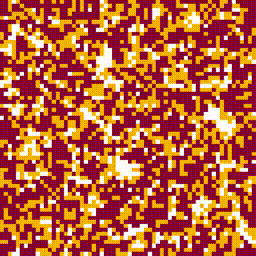Stochastic cellular automata are models that are based on a 2D grid of cells, each cell being in one of several discrete states. At each time step, those cells can transition from one state to another with a given probability. This probability typically depends on the neighbors of the cell and the global state of the landscape.
You probably already know Conway’s game of life – a stochastic cellular automaton is the same, except that cell transitions do not always occur when a rule is satisfied, but with a given probability. It typically looks like this:

This package is an engine for stochastic cellular automata (SCA), although it can also run deterministic cellular automata. The objective is to provide a high-level, declarative interface to an SCA model, and leave the implementation details to the package.
For example, Kubo’s forest model (Kubo, 1996), which describes how gaps created by wind in a forest appear and expand, can be implemented using the following few lines of code:
kubo <- camodel(
transition(from = "TREE",
to = "EMPTY",
prob = ~ d + delta * q["EMPTY"] ),
transition(from = "EMPTY",
to = "TREE",
prob = ~ alpha * p["TREE"]),
parms = list(d = 0.125,
delta = 0.1,
alpha = 0.25),
wrap = TRUE,
neighbors = 4,
all_states = c("EMPTY", "TREE")
)Running the model for 200 iterations on a 100x100 grid is another couple of lines:
initmat <- generate_initmat(kubo, c(TREE = 0.5, EMPTY = 0.5), nrow = 100, nc = 100)
run_camodel(kubo, initmat, times = seq(0, 200))chouca can display results as they are being simulated,
making visual explorations easier:
options <- list(custom_output_fun = landscape_plotter(kubo, fps_cap = 24))
run_camodel(kubo, initmat, times = seq(0, 200), control = options)Stochastic cellular automata are widely used in ecology to describe
the dynamics of organisms over space, and investigate how their
interactions may affect the dynamic of the system as a whole. However,
implementing those models is often done using ad-hoc R code, which is
slow, error-prone, and does not encourage exploring different variations
around a single model. chouca provides a high-level
interface to such type of models, in order to reduce errors, and spend
more time on model design, rather than debugging ugly code.
chouca wants to be user-friendly, yet provide very good
performance. Several backend are provided, the main one being in C++.
chouca can also emit and compile the required C++ code at
runtime for a specific model. This allows making optimizations that
would be impossible otherwise, and improves performance typically one or
two orders of magnitude.
Here are a few graphs that should help you judge what performance to
expect from chouca. These curves represent the average
performance across a few models taken from the literature:

chouca can be installed with the devtools
package directly from github:
devtools::install_github("alexgenin/chouca")chouca is mainly developed by Alexandre Génin, but
contributions and discussion are of course welcome!
This work has received funding from the European Union’s Horizon 2020 research and innovation programme under the Marie Sklodowska-Curie grant agreement N°896159.